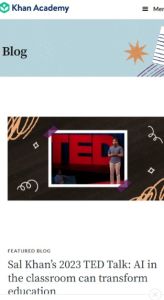Rejoignez getAbstract pour lire le résumé !

Rejoignez getAbstract pour lire le résumé !
Sal Khan
How AI Could Save (Not Destroy) Education
Khan Academy, 2023
Aperçu
Sure, students can use generative AI to cheat, but it can just as easily help them learn to think.
Recommendation
So far, modern educational practices haven’t been able to solve Bloom’s 2 Sigma Problem, which suggests that personalized one-on-one tutoring could shift the bell curve of student achievement two whole standard deviations to the right. Could AI tutors be the missing link that could transform Bloom’s 2 Sigma Problem into a 2 Sigma Solution? Sal Khan of Khan Academy thinks so. In this engaging TED talk, Khan makes an argument that the thoughtful implementation of AI tutors could revolutionize education.
Summary
About the Speaker
Sal Khan founded Khan Academy, a nonprofit educational organization with a mission to provide free education to students around the world. Khan holds degrees from MIT and Harvard Business School, and worked as a hedge fund analyst before founding Khan Academy.
By the same author
Learners who read this summary also read
Related Skills






















Comment on this summary